Caught in a Culture War
- By Susan K. Lewis
- Posted 11.01.07
- NOVA
Journalist Lauri Lebo grew up in the area of Dover, Pennsylvania, and her father was a devout fundamentalist Christian. When a controversy over the teaching of evolution began to tear the town apart, Lebo not only covered the story but also was personally affected by it.
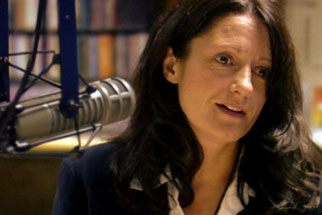 Listen
Listen
In a conflict about the teaching of evolution, journalist Laurie Lebo found herself at odds with her own family.
Transcript
Caught in a Culture War
Posted: November 11, 2001
NARRATOR: You're listening to a NOVA podcast.
In the fall of 2004, a battle over how evolution should be taught in the public schools tore apart the small town of Dover, Pennsylvania. Journalist Lauri Lebo, who had grown up in the area, was working for a local paper when the battle began.
LAURI LEBO: This was the first time, in October of 2004, that a school board, public school board, had put intelligent design into the science curriculum. That had not been done before, so it became pretty clear the day after they had done this that this was going to be a test case. This had never been done before, and there were a lot of people who opposed having what they considered to be religion in science class, that there's no place for that, and they started coming forward.
NARRATOR: But was the school board actually putting religion into a public school? That was the question at the heart of the landmark court case that followed. Before the trial started, Lauri Lebo didn't have a preconceived notion of how intelligent design should be judged. If anything, she hoped that it would hold up as valid science.
LAURI LEBO: When I was—first heard about this phrase, "intelligent design," I thought, well, you know, I didn't know anything about methodological naturalism and other basic principles of the scientific method, and, and so I thought, huh, scientific proof of the existence of God. That would be really cool, wouldn't it? I mean, I thought, I honestly thought I could finally sleep really well at night, you know?
NARRATOR: Sleep well, in part, because it would bring her closer to her father, a fundamentalist Christian who supported the school board's move and didn't accept evolution. But as a reporter, sitting day after day in the courtroom through six weeks of expert testimony, Lebo was convinced that the case for evolution was solid.
LAURI LEBO: Margaret Talbot wrote in the New Yorker that, that the trial was like the science class you wish you could have taken, and when I read that I'm like, that's exactly what this was. Every day we'd go in to the trial, and we'd learn something else incredible about, you know, the fossil record, about the Avida program, which is a software program that actually shows evolution. It was fascinating.
NARRATOR: As the second half of the trial approached, many people looked forward to hearing the school board's case for intelligent design.
LAURI LEBO: I think there was this idea, especially among those who weren't sitting in the trial every day that, yes, the plaintiff's attorneys had—and the scientists had put on an amazing case in supporting evolutionary theory, but that when the defense started, they might, you know—then we'll see some pretty interesting stuff too on the other side, and that just absolutely never happened.
If anything, I think the case for evolutionary theory got stronger under the defense's arguments because that's when, for instance, under Michael Behe it was shown that for intelligent design to be accepted as a scientific theory, you would have to change the definition of science, which would make astrology also a theory.
NARRATOR: Judge John Jones, who presided over the case, ultimately ruled that intelligent design has no legitimate place in a science classroom. By the time the trial ended, Lauri Lebo, a woman raised with a strong Christian faith, had become an advocate for the teaching of evolution. She argued about the trial with her father before his death, and from this painful experience, Lebo now has a personal insight into what might motivate many Americans to question evolution.
LAURI LEBO: I think there's this fear that if you don't believe the literal truth of the Bible, that it all starts crumbling down, and I will tell you that my father was quite the fundamentalist Christian, and I've come to understand that if you truly believe the people you love most in this world don't believe as you, and therefore they're going to go to hell for all eternity, if you truly believe that, I can't believe that anything else could possibly matter. I don't believe the First Amendment would matter. I don't believe science would matter. I mean, we're talking about being reunited with the people you love for eternity. That's a compassionate—I mean, that's my compassionate view of things.
I do get frustrated sometimes with people trying to impose their religious beliefs on others, but I try to remember that that's maybe what's motivating them.
Credits
Audio Credits
- Produced by
- Susan K. Lewis and David Levin
- Interview by
- Gary Johnstone
- "Judgment Day: Intelligent Design on Trial" is produced by
- NOVA and Vulcan Productions, Inc. in association with The Big Table Film Company.
Image Credits
- (Lauri Lebo)
- © WGBH Educational Foundation
Related Links
-
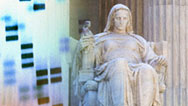
Intelligent Design on Trial
Science is "Exhibit A" in a landmark trial on the teaching of evolution.
-
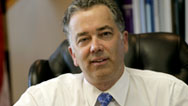
Judging Intelligent Design
Does intelligent design qualify as science? Not according to Judge John Jones, who ruled in the landmark Dover case.
-
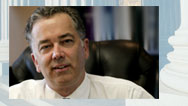
The Judge Speaks
Hear Judge John Jones read key excerpts from a landmark court case on the teaching of evolution.
-
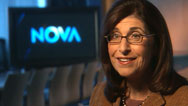
Why NOVA Covered the Case
In this short video, NOVA's Paula Apsell explains the reasons for making “Intelligent Design on Trial.”
You need the Flash Player plug-in to view this content.

